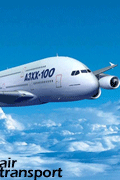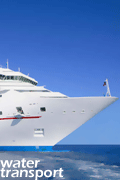Wednesday, October 15, 2008
Advanced brake technology will enable locomotive engineers to have better train control, lower the risk of derailment, and allow trains to safely travel longer distances between required brake tests under a new federal rule, announced U.S. Transportation Secretary Mary E. Peters.
"The concept is simple, better brakes allow trains to operate more safely," said Secretary Peters, noting that the Federal Railroad Administration's (FRA) final rule on Electronically Controlled Pneumatic (ECP) brakes will facilitate the widespread deployment of this technology by railroads and railcar owners.
Peters explained that ECP brakes provide numerous safety and business benefits compared to conventional air brake systems that have changed little since the 1870s. ECP technology provides simultaneous and graduated application and release of brakes on all rail cars within a train, resulting in shorter stopping distances, longer trains that can operate at faster speeds, improved fuel efficiency, and reduced emissions. It also complements other advanced rail safety technologies like Positive Train Control systems, she added.
"I believe that railroads and railcar owners will increasingly realize the benefits of ECP brake systems and will make the necessary investments," said FRA Administrator Joseph H. Boardman, adding that while ECP brakes are not mandated, the final rule establishes the performance requirements for its use.
Boardman said the final rule permits trains to travel up to 3,500 miles without stopping periodically for certain routine brake inspections - more than double the current limit - because ECP brake systems contain continual electronic self-diagnostic 'health check' capabilities that inform train crews when maintenance is required. For example, an ECP-equipped intermodal container train originating from the ports of Los Angeles-Long Beach may safely travel all the way to Chicago without stopping for a routine brake test. Similarly, ECP brake-equipped coal trains will be able to make quicker deliveries from western coal fields to power plants in the eastern and southern states.
The final rule requires that ECP brake systems fully comply with existing industry standards and that certain railroad operating rules and training programs be modified to ensure workers have the knowledge and skills required to properly utilize the systems.
Under FRA approved waivers, Norfolk Southern Railway and BNSF Railway are already operating several ECP-equipped coal trains, and the Union Pacific Railroad is expected to begin operating some ECP-equipped intermodal container trains this fall.
The final rule is available at: http://federalregister.gov/OFRUpload/OFRData/2008-22549_PI.pdf.
"The concept is simple, better brakes allow trains to operate more safely," said Secretary Peters, noting that the Federal Railroad Administration's (FRA) final rule on Electronically Controlled Pneumatic (ECP) brakes will facilitate the widespread deployment of this technology by railroads and railcar owners.
Peters explained that ECP brakes provide numerous safety and business benefits compared to conventional air brake systems that have changed little since the 1870s. ECP technology provides simultaneous and graduated application and release of brakes on all rail cars within a train, resulting in shorter stopping distances, longer trains that can operate at faster speeds, improved fuel efficiency, and reduced emissions. It also complements other advanced rail safety technologies like Positive Train Control systems, she added.
"I believe that railroads and railcar owners will increasingly realize the benefits of ECP brake systems and will make the necessary investments," said FRA Administrator Joseph H. Boardman, adding that while ECP brakes are not mandated, the final rule establishes the performance requirements for its use.
Boardman said the final rule permits trains to travel up to 3,500 miles without stopping periodically for certain routine brake inspections - more than double the current limit - because ECP brake systems contain continual electronic self-diagnostic 'health check' capabilities that inform train crews when maintenance is required. For example, an ECP-equipped intermodal container train originating from the ports of Los Angeles-Long Beach may safely travel all the way to Chicago without stopping for a routine brake test. Similarly, ECP brake-equipped coal trains will be able to make quicker deliveries from western coal fields to power plants in the eastern and southern states.
The final rule requires that ECP brake systems fully comply with existing industry standards and that certain railroad operating rules and training programs be modified to ensure workers have the knowledge and skills required to properly utilize the systems.
Under FRA approved waivers, Norfolk Southern Railway and BNSF Railway are already operating several ECP-equipped coal trains, and the Union Pacific Railroad is expected to begin operating some ECP-equipped intermodal container trains this fall.
The final rule is available at: http://federalregister.gov/OFRUpload/OFRData/2008-22549_PI.pdf.
posted by transport blogs
@ 10:04 PM
permanent link | Post a Comment
|
![]()








